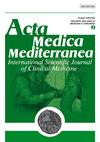孤立性股骨颈骨折髋关节形态的年龄相关性比较
IF 0.3
4区 医学
Q4 Medicine
引用次数: 0
摘要
目的:青年人股骨颈骨折多因高能外伤引起,治疗方法与老年人不同。不同年龄的髋关节几何参数对骨折形态有影响。本研究旨在比较青年和老年人群的髋关节形态。材料和方法:纳入45例孤立性股骨颈骨折患者。患者按年龄分为两组;第一组(小于60岁)和第二组(大于60岁)。比较两组间Garden和Pauwels分类、尖锐角度(髋臼指数- ai)、髋臼深度(AD)、髋轴长度(HLA)、颈轴角(NSA)、中心边缘角(CE)、Singh指数和股骨头挤压指数。结果:组1(22例)平均年龄48±10.4岁,组2(23例)平均年龄77±6.3岁。3个参数有显著差异;两组的平均HLA(13.4±1.4 cm vs 12±1.1 cm) (p: 0.034)、锐角(37.9°±5°vs 40.3°±3°)(p: 0.047)、CE(38.1°±6.2°vs 34.8°±4.5°)(p: 0.48)。AD、NSA、Singh指数、挤压指数均无统计学差异。结论:我们的研究显示了股骨近端和髋臼形态对年轻患者股骨颈骨折的影响,可能有助于未来研究揭示髋部形态与骨折类型之间的相关性。本文章由计算机程序翻译,如有差异,请以英文原文为准。
Age-related Comparison of Hip Joint Morphology in Isolated Femur Neck Fractures
Objective: Femoral neck fractures mostly occurs due to high-energy trauma in young population and management differs compared to elderly. Different geometric parameters in the hip joint can play a role in fracture morphology regarding to the age. Present study aims to compare hip morphology between young and elderly population
Materials and methods: 45 patients with isolated femoral neck fracture included to the study. Patients were divided into two regarding to the age; group 1 (younger than 60 yr.) and group 2 (older than 60 yr.). Garden and Pauwels classifications, Sharp angle (acetabular index-AI), acetabular depth (AD), Hip-axis length (HLA), Neck-shaft angle (NSA), Center-edge angle (CE), Singh indexes and femur head extrusion indexes were compared between groups.
Results: The mean age of group 1 (22 patients) was 48 ± 10.4 while the mean age of group 2 (23 patients) was 77 ± 6.3. Significant differences found in 3 parameters; the mean HLA (13.4 ± 1.4 cm vs 12 ± 1.1 cm) (p: 0,034), the Sharp angle (37.9° ± 5° vs 40.3° ± 3°) (p: 0.047) and the CE (38.1° ± 6.2° vs 34.8° ± 4.5°) (p: 0.48) between group 1 and 2 respectively. No statistically significant difference was found in terms of AD, NSA, Singh index and extrusion index.
Conclusions: Our study shows influence of proximal femoral and acetabular morphology on femoral neck fracture in young patients and may help future studies to reveal the relevance between hip morphology and fractures type.
求助全文
通过发布文献求助,成功后即可免费获取论文全文。
去求助
来源期刊

Acta Medica Mediterranea
医学-医学:内科
自引率
0.00%
发文量
0
审稿时长
6-12 weeks
期刊介绍:
Acta Medica Mediterranea is an indipendent, international, English-language, peer-reviewed journal, online and open-access, designed for internists and phisicians.
The journal publishes a variety of manuscript types, including review articles, original research, case reports and letters to the editor.
 求助内容:
求助内容: 应助结果提醒方式:
应助结果提醒方式:


